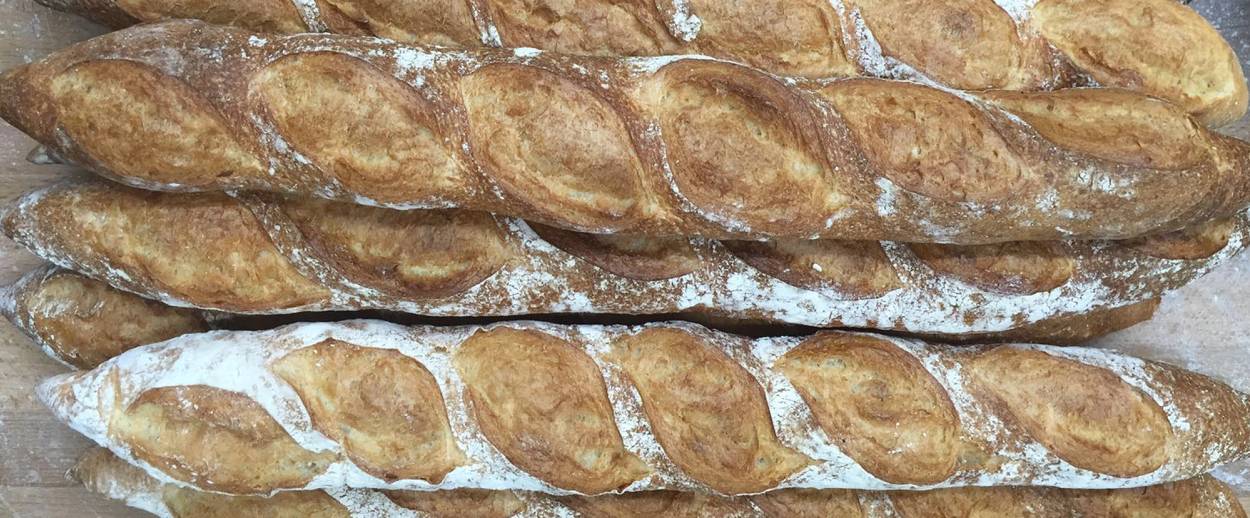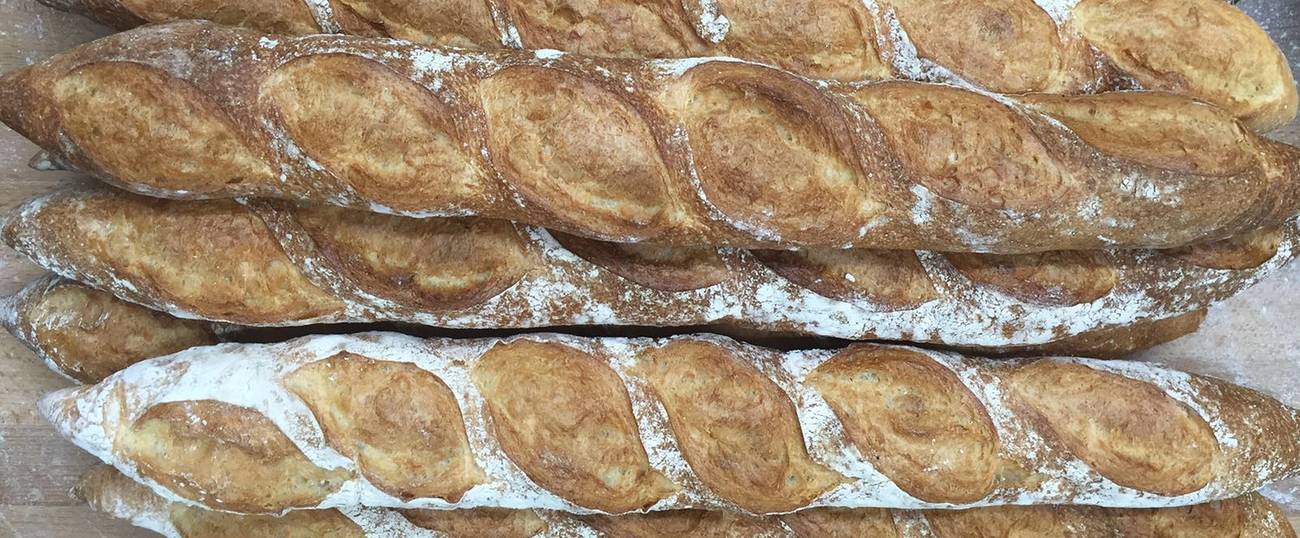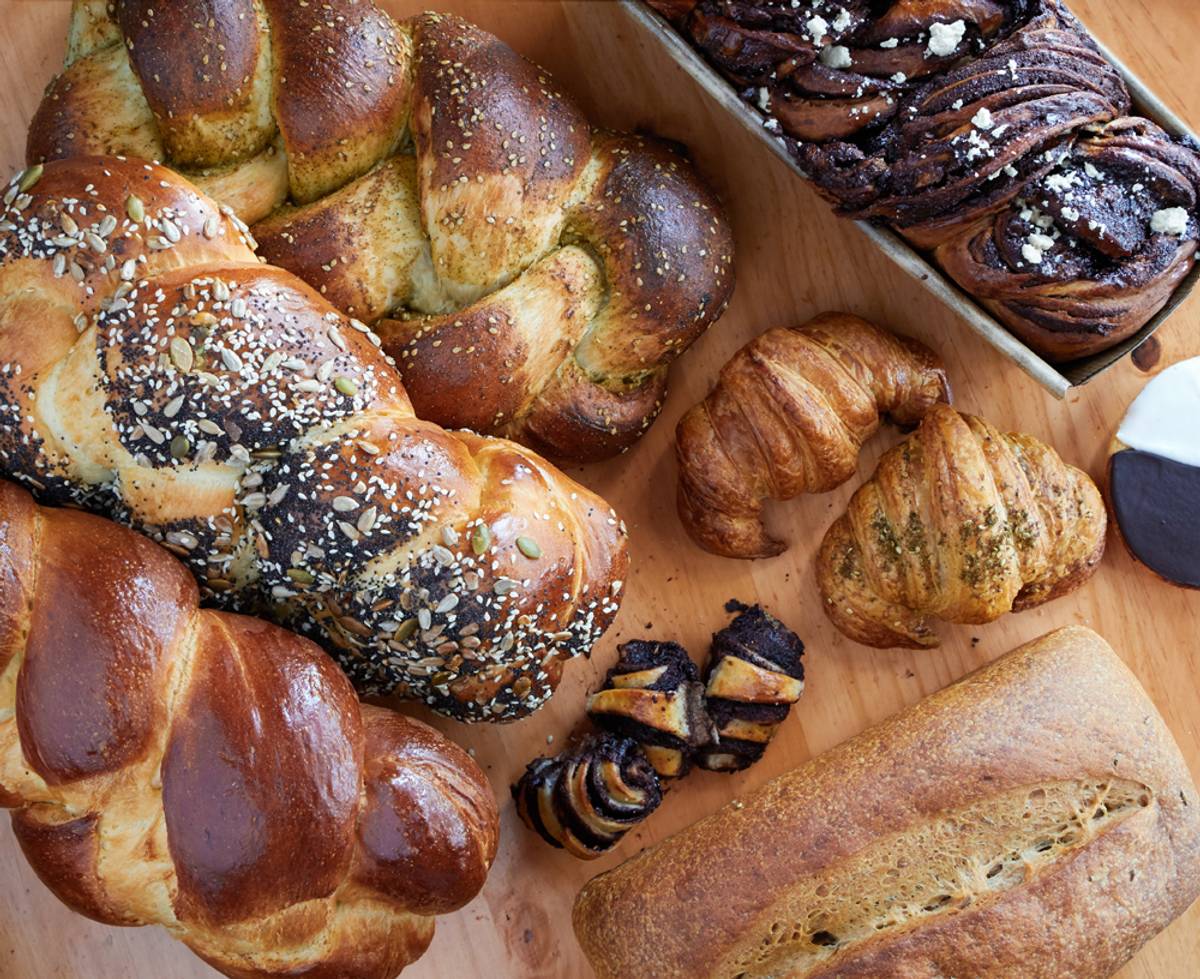The Best of Bread
Jewish bakers are rethinking everything they thought they knew about rye bread. And baguettes. And croissants. And scones.




When Stanley Ginsberg first envisioned writing a cookbook about rye bread, his thoughts turned to the things he grew up eating as a Jewish kid in post-WWII Brooklyn: pumpernickel, kornbroyt (New York corn rye), and caraway-flecked delicatessen rye. Writers, after all, are routinely advised to “write what you know.” And as a born and bred New Yorker whose previous cookbook was essentially a love song to the breads, cookies, and cakes found in the Jewish bakeries of his youth, Ginsberg knew from rye bread—or so he thought.
“I was in search of the breads that my parents and grandparents ate in Europe,” he told me recently. “That was the wedge that opened the door.”
His research ultimately took him into unfamiliar territory. The Rye Baker: Classic Breads from Europe and America, out this month, is a deep-dive exploration into the craft behind working with a dough that Ginsberg calls “sticky and challenging” (compared to wheat), but entirely beguiling. “Rye was the stuff that, for centuries, fueled Europe’s empires,” he said. “So there’s an incredible tradition and culture of rye bread in much of the Western world that we don’t really know about here.”
The 75 recipes in The Rye Baker (of more than 140 that Ginsberg uncovered) transcend Jewish cuisine, covering the snappy crispbread found in Sweden, Germany’s crusty rye boules, and France’s fragrant apple-cider rye. Still, from the perspective of Jewish cuisine, Ginsberg’s timing for a rye-focused book couldn’t be better. Over the last half-decade, a new crop of Jewish bakeries has opened that celebrates this same artisanal baking spirit. Just like Ginsberg, the bakers at the helm of these establishments are starting from what they know and transforming it into something fresh, unexpected, and delicious.

Take Essen Bakery in South Philadelphia. The petite bakery and café opened in April of this year, and has already developed a cult following for its za’atar-spiced challah. Owner Tova du Plessis is a South African transplant who grew up baking with her mother. “I have clear memories of my mom showing me how to shape babka as a young child,” she told me. As an adult, her challah quickly became the stuff of legends among her Friday night dinner community. “I was always pushing myself to impress my friends, and it just kept getting better—lighter, fluffier, better crumb, better flavor,” she said.
Not surprisingly, her plan to become a doctor morphed into a pastry degree from the Culinary Institute of America. And when a bakery space opened up just a 15-minute walk from her home in Philadelphia, she jumped at the opportunity to turn her passion into a business. “The first thing that came to my mind was to open a Jewish place,” she said. “The babka you buy at the store has been sitting on the shelf for weeks and is full of preservatives. I wanted to offer something different.”
Today, Essen Bakery sells babka in two flavors: cinnamon hazelnut and chocolate-halva. “The halva takes it to a new level,” she said. She also makes an Israeli-style rugelach, which starts with a soft, yeasted dough and fills it with high-quality chocolate. In addition to challah, Essen sells a rye bread with pickle juice, mustard, and caraway seeds baked directly into the dough. “It basically tastes like a deli sandwich before you put anything on it,” du Plessis said.
In Montreal, Jeffrey Finkelstein runs Boulangerie Hof Kelsten, a bustling wholesale bread company he opened in 2009. Finkelstein had spent several years working in some of the best restaurant kitchens in the world, then came home to try something close to his heart. “I wanted to re-create my grandmother’s dining room,” he said, recalling the lavish yet homey meals she would make for Shabbat dinner and the holidays, and the rugelach and fresh-squeezed orange juice she regularly greeted visitors with. He also wanted to reclaim the from-scratch cooking that had once typified Montreal’s Jewish eateries but had been lost in recent decades. “Back in the day, Jewish smoked-meat places made everything on-site,” he said. “The old places that are still around have huge rooms to smoke stuff in that haven’t been used in 50 years.”
So he started baking—in his mother’s kitchen. “She was traveling for a few months, so I turned her home into a micro-bakery,” Finkelstein said. “By the time she came back, there was nothing in her fridge but dough and her dining-room table had become a proofing station.”
His persistence (and his mother’s superhuman patience) paid off because he now employs 22 people and bakes sourdough, challah, and caraway-flecked rye along with other breads for nearly 50 wholesale customers. In 2013, he added a café that serves Jewish-inspired sandwiches (brisket, chopped liver, gravlax, and a house-made “veal bacon” VLT) and pastries from buttery, jam-filled rugelach to bialys and everything-bagel-spiced scones.
Craft baking has reached into the kosher market as well. In 2012, Miami-native Zak Stern opened an exceedingly hip bakery and cafe in his hometown called Zak the Baker. Unless one is specifically looking for it, there is almost no indication that the place, which could easily be featured on the pages of Kinfolk, adheres to the strictest possible interpretation of the kosher laws.
Except for the challah, all of the breads Stern and his team make—multigrain, rye, country wheat, and sourdough baguettes, among others—are made with natural leaven instead of commercial yeast. And the café menu, with its pastrami-spiced gravlax, Swiss and sauerkraut on rye “Reuben,” schmaltz herring and crème fraiche toast, and bevy of pastries (everything from cheese danishes and coconut macaroons to the Cuban-inspired guava-and-cheese pastelitos), regularly attracts lines out the door.
Meanwhile, in Crown Heights, Brooklyn, Levi Krinsky runs Brooklyn Artisan Bakehouse, a wholesale kosher bread company with, for the last six months, a bustling retail cafe. Like du Plessis, Krinsky did not start out with culinary ambitions. But in 2014, inspired by his mother’s Jewish Italian heritage, he decided to build a pizza oven from scratch. “I really just wanted a summer project,” he said. “But once it was completed, I realized someone had to make pizza and breads in it. That is what set me off.” So he began watching YouTube videos, reading baking cookbooks (Flour Water Salt Yeast by Ken Forkish is a favorite) and teaching himself the art of bread baking. Meanwhile, Crown Heights’ Orthodox and Lubavitch communities were beginning to seek out artisanal kosher food, but the neighborhood did not have any kosher-certified craft bakeries.
Krinsky focuses less on traditional Jewish breads (as those are already available in abundance in his neighborhood), and more on making the best possible versions of European classics, which are harder to find. Almost as soon as he started selling his loaves of ciabatta and sourdough and rustic French baguettes at a local gourmet food shop, people came running. Before long, Brooklyn Artisan Bakehouse was supplying nearly two dozen supermarkets plus a handful of restaurants and caterers. The recently opened cafe, which serves coffee, salads and egg dishes, and a variety of pastries, has also grown quickly with almost no marketing. “Most places in the neighborhood buy parbaked pastries that are made with shortening and preservatives,” Krinksy said. “Our croissants, cinnamon buns, and scones are all made on-site and with butter. We are a totally different experience.”
New York City, of course, has a long pedigree of Jewish baking. At the turn of the 20th century, there were three dozen kosher bakeries on the Lower East Side alone, as well as a robust bagel-baking union that boasted 300 members and conducted meetings in Yiddish. Today, a handful of shops keep that legacy alive, like the 100-year old Orwashers, which badges itself as the city’s original artisan bakery. But by bringing high-quality European-style breads to contemporary kosher consumers, Krinsky is charting a new path in the city.
So why is Jewish bread having a renaissance now? According to Ginsberg, for millennial bakers, it represents a form of “cultural t’shuvah” (Hebrew for “returning”). As with the larger Jewish food movement, he described it as “a search for connection with earlier generations in a way that is easily accessible.” In other words, eating freshly baked rye or challah that tastes like the breads our ancestors ate, or dipping a hunk of kosher sourdough baguette into high-quality olive oil, offers an opportunity to merge one’s Jewish and contemporary identities together in a single bite. Not bad for a piece of toast.
***
Like this article? Sign up for our Daily Digest to get Tablet Magazine’s new content in your inbox each morning.